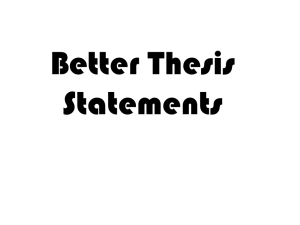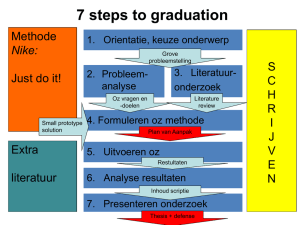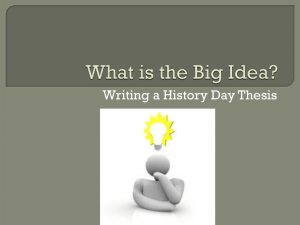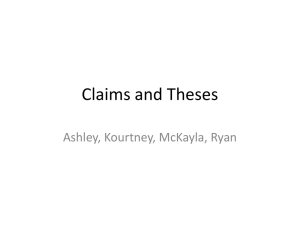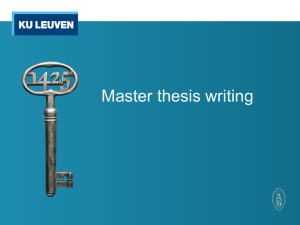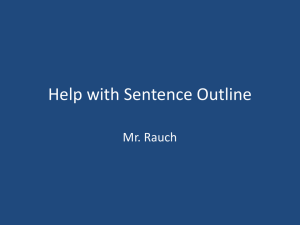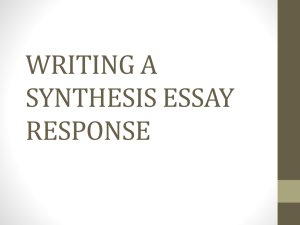DRACULA
advertisement
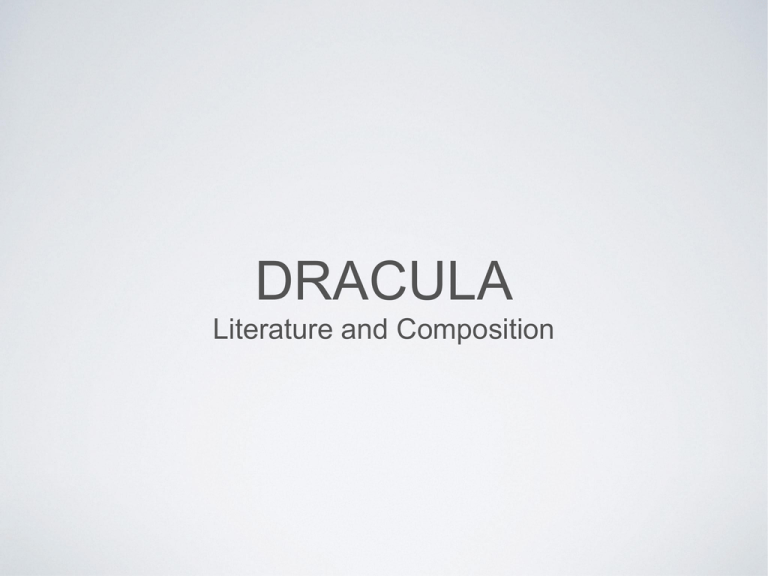
DRACULA Literature and Composition OBJECTIVES The Research Paper Process Review of SOAPSTone Review of Academic Vocabulary FRANKENSTEIN THE RESEARCH PROCESS • Selection of your topic • Selection of resources THE THESIS STATEMENT • What is a "thesis statement"? • A thesis statement is the single most important sentence in your paper • A thesis statement tells your audience what the paper will be about • A thesis statement provides a forecast for the entire paper THE THESIS STATEMENT • An analytical thesis statement will usually answer the questions "HOW" and "WHY" THE THESIS STATEMENT • The "HOW" questiosn refers to how the author (speaker) of a text goes about presenting information or stylistic choices to their readers • When you analyze a text, the author will write about one aspect or element of the text • The reader asks themselves, "How does this author fulfill his purpose in this text?" THE THESIS STATEMENT • The author might fulfill the purpose by: • Using a specific tone or style • Using specific vocabulary choices • Organizing or structuring the text in a certain way • Orchestrating a connection between the beginning and ending • Using figurative language • Using specific symbolism THE THESIS STATEMENT • "In DRACULA, Bram Stoker uses the two Lucys' as twin symbols..." • Dracula himself symbolizes the mysterious Other." THE THESIS STATEMENT • Each of the prior examples is an acceptable beginning of a working thesis because each names the character and symbolic representation the paper will discuss. • The readers are told which character is under discussion and what they symbolize. THE THESIS STATEMENT • However, the paper needs to tell the reader the "WHY" • Why, according to the author's interpretation, does Stoker use this symbolism? THE THESIS STATEMENT • "In DRACULA, Bram Stoker uses the "two Lucys' as twin symbols of perfection and repulsion to warn women in Victorian England of the disastrous outcome of becoming a New Woman." • As an expression of Victorian Era England's fear of invasion, Dracula himself symbolizes the mysterious Other." THE THESIS STATEMENT • A two-sentence thesis: • "Stoker uses the Crew of Light to symbolize the ideal man of the age. This symbolism allows readers to understand the values of the late-Victorian era." THE THESIS STATEMENT • A two-clause thesis: • "Harker represents the masculine struggle for identity in the Victorian Era; through his actions and reactions, Stoker demonstrates the confusion about gender that was surfacing near the end of the nineteenth century." THE THESIS STATEMENT • The thesis statement should meet the following requirements: • 1. It should be interesting to the reader. The writer's brain works differently than the reader. Show a point of view or perspective that the reader might not have considered before. THE THESIS STATEMENT • 2. It should have precise and specific wording. Avoid such words as: good, well, bad, etc. When the author is first composing, they should place vague words in parentheses or highlight them. Once the idea is settled, the author can back and refine the wording. THE THESIS STATEMENT • 3. It should be manageable. The author should not try to cover every bit in the paper strive for simplicity and consistency. • Technical note: If the author's full name is used in the introduction, the last name may be used in the thesis statement. THE THESIS STATEMENT • It is possible that the thesis statement might (and probably will) change as the paper is being drafted and revised. During the writing process, ideas become clearer or sometimes even shift to a slightly different interpretation. • THIS IS OKAY!!!! THE THESIS STATEMENT • Sometimes writers wait until they have drafted an entire paper before truly shaping their thesis statement. • They will begin with a rough statement, almost a "sketch", of what they want their thesis to be, then they write the essay, then they go back and refine the thesis. • THE THESIS STATEMENT When the author (you) think about your thesis, in the beginning, go for the two-sentence approach. • Let the first sentence answer the "how" question. • Let your second sentence answer the "why" question. • During revisions, you will find it easier to TOPICS TO THINK ABOUT • Describe Van Helsing's role as Dracula's antagonist. Why is he the most threatening adversary to the Count? • Contrast the roles of Mina and Lucy. How are the women similar/different? Why is Lucy the first to fall under Dracula's spell? • Describe the use of imagery and how it adds to both the atmosphere of the novel and character development. TOPICS TO THINK ABOUT • In what way is the novel a recounting of a "holy war" of good versus evil? Which characters or ideas does Stoker depict as "good" and "evil"? How do these characters and ideas conflict with the story? • Describe the appearances Dracula makes throughout the novel. What does Stoker achieve by keeping his title character in the shadows for much of the novel? TOPICS TO THINK ABOUT • How does Count Dracula pervert elements of Christian tradition? What is the significance of this perversion?


